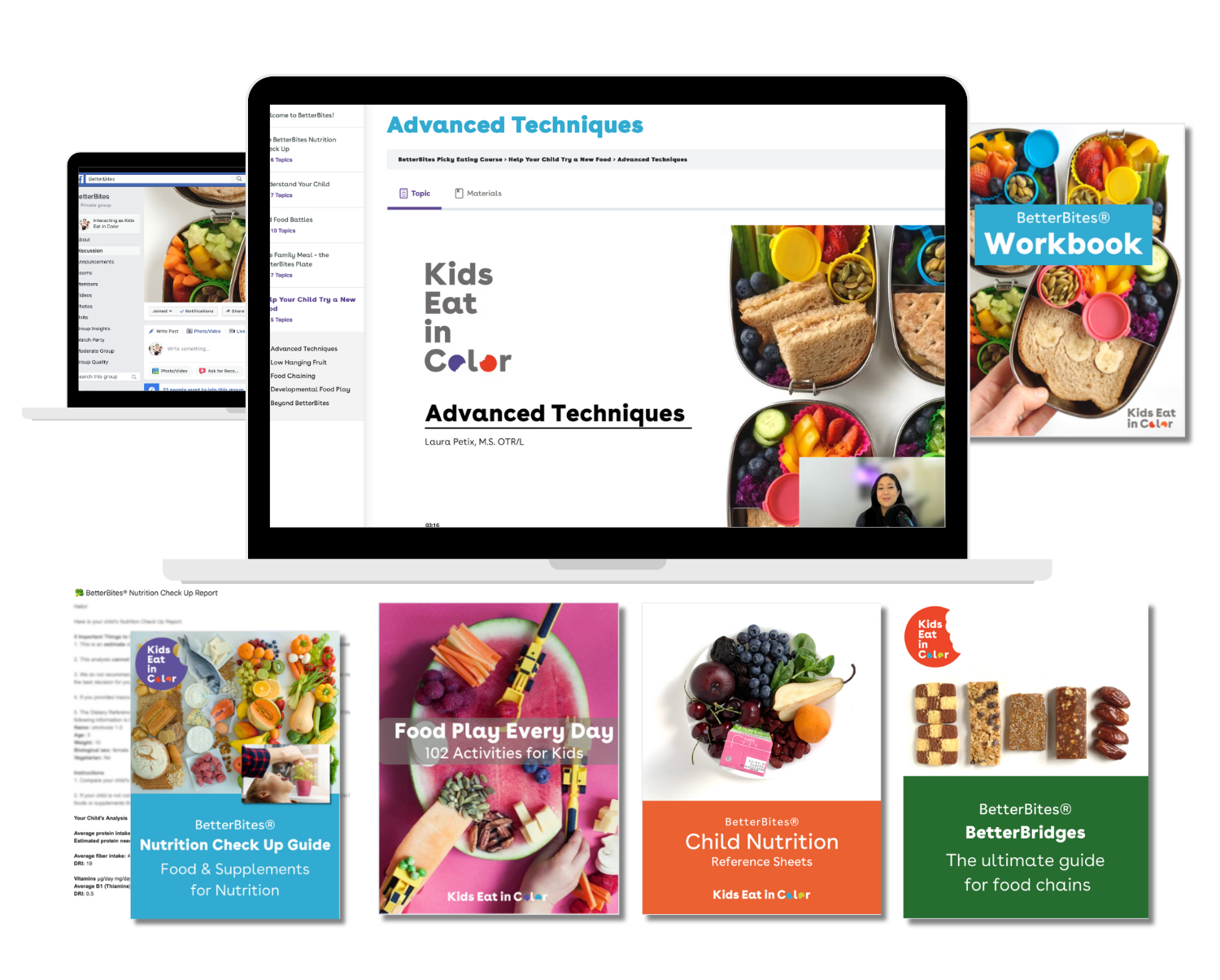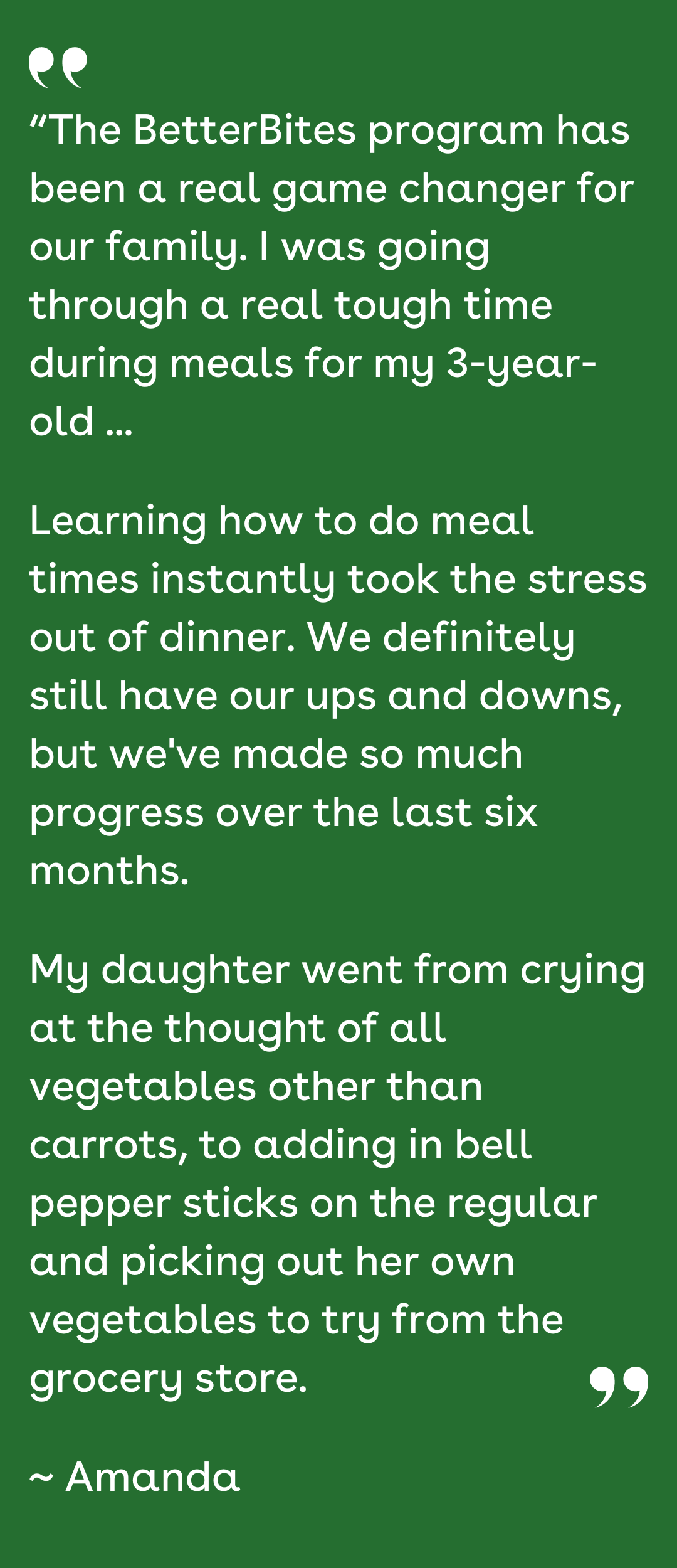Restrictive Picky Eating

Restrictive Picky Eating
Based on the answers you provided in the screener*, we call this restrictive picky eating. It is not typical. We emailed you your guide “Assessing Restrictive Picky Eating: A Parent’s Guide to Next Steps”. Restrictive picky eaters are at higher risk of nutritional deficiencies, social challenges, and extreme picky eating.
Now is the time to take action! If you have the capacity to address your child’s eating, we recommend doing it as soon as possible. The younger a child is the more likely they are to make faster progress and prevent the progression to extreme picky eating. Catching picky eating between ages 0-3 years is the ideal, but it is perfectly fine to start later (you are in good company if your child is 4+!).
It is never too late to address your child’s eating.
Here are some of the options that you have to address your child’s eating*:
- Immediately start the BetterBites® Picky Eating Program. This will give you the tools you need to change your home environment to be supportive of your child’s restrictive picky eating. It will also teach you therapeutic feeding techniques. We recommend this right away for all families of restrictive picky eaters, because there is no waitlist, it’s affordable (around the cost of one self-pay feeding therapy session), and it’s flexible.
- Consider whether your child needs a specialist. Here are some cases and the practitioners that some people consider (this is not an exhaustive list):
- nutrition-related deficiency/weight loss – medical doctor or registered dietitian
- medical problem – medical practitioner
- speech or chewing difficulty – pediatric occupational therapist or speech language pathologist
- Consider feeding therapy. Feeding therapy is done one-on-one between a feeding therapist and your child. They will use therapeutic feeding techniques and treat your child. If you are considering feeding therapy, starting the BetterBites program now can prevent losing valuable time to work on your child’s eating while you are exploring the possibility of feeding therapy.
Join the BetterBites Picky Eating Program now.
Deciding whether to “wait and see”
Some parents of kids with restrictive picky eating wonder if they should just “wait and see” if it resolves. It’s impossible to know for sure if it will resolve or become more extreme. If your child has red flags for extreme picky eating, however, we don’t recommend the “wait and see” approach, we recommend addressing it now with the BetterBites Picky Eating Program. Here is a list of red flags for higher risk of extreme picky eating assembled by our pediatric occupational therapists:
- Your child spent time in the NICU and required a newborn feeding specialist (feeding interventions, NG tube, etc.)
- Your child experienced more than one incident of nasal reflux (vomiting or spitting up out of their nose)
- Your child frequently chokes, coughs or gags on liquids
- Your child has had a negative experience with food (excessive gagging to the point of vomiting, choking, or prolonged pain with eating related to a chronic sickness or medical condition)
- Your child routinely “pockets” food (holds food in their mouth without swallowing it) while eating
- Your child avoids all foods in a specific texture (wet, squishy, crunchy, etc.)
- Your child is upset or cries often around food?
- Your child has ongoing poor weight gain (dropping percentiles on the growth curve) or weight loss
- Your child’s healthcare provider has concern about your child’s growth
- Your child gets anxious or avoids social gatherings due to a concern with eating foods
- Your child has very strict brand preferences (like only eating hamburgers from one restaurant)
- Your child was picky before 11 months old.
These red flags don’t guarantee that your child will be an extreme picky eater in the future. They are “risk factors” – meaning kids who have them are more likely to be extreme picky eaters. So, if you are trying to decide whether to “wait and see” or not, if your child has the risk factors, especially if they have more than one, we suggest doing something now rather than later.
*If you suspect your child has a nutritional, medical, developmental or any other concern, we recommend consulting with your child’s qualified healthcare provider.
Frequently Asked Questions
What is the difference between BetterBites and feeding therapy?
The BetterBites program equips parents with feeding therapy techniques and practical strategies that support their child’s needs. The program includes access to a nutritional assessment for your child, how to conduct in-home therapeutic feeding sessions designed by our occupational therapist, meal planning education from a registered dietitian and access to a moderated online community for resources and support.
Feeding therapy provides in-person feeding support and can also include addressing chewing and swallowing skills among other things. In Feeding therapy your child works one-on-one with a therapist, usually an occupational therapist or speech language pathologist. The therapist conducts therapeutic feeding sessions. They will likely also give “homework” activities to do at home. They may or may not provide basic education about what to do at home beyond the homework.
How do people use BetterBites in relation to feeding therapy?
Families use BetterBites:
- Instead of feeding therapy, as a home-based alternative that is affordable, flexible, and immediately available.
- After feeding therapy, if feeding therapy did not work.
- While waiting for feeding therapy because sometimes there are long waitlists, but while waiting, you are losing valuable time during which your child could be improving their eating.
- At the same time as feeding therapy. Families find BetterBites to provide comprehensive information on how to live a lifestyle and set up your home to support your child’s eating.
- In preparation for feeding therapy. Parents want to get the most out of feeding therapy. They learn and start using the best practices and home practices from BetterBites, then when they start feeding therapy, they can make progress faster and more consistently.
Will my child outgrow their picky eating?
It is possible that your child will outgrow their picky eating. Not all people outgrow picky eating, however, and the longer and more extreme their picky eating, the more likely it will persist into adulthood. For children who do outgrow it, there’s no way to know what their timeline might be.
I’m already “doing all the right things”, what is in the BetterBites program that I haven’t seen on social media?
We do not share therapeutic feeding therapy techniques taught in this program on social media. Usually parents are not using the feeding therapy techniques provided by our occupational therapist. This program also includes a nutrition assessment to get an idea of whether your child is at with their nutritional intake, materials to help implement the feeding therapy techniques, and a moderated community with input from registered dietitians, occupational therapists, and other specialists as needed.
Do I have to do something?
It is always up to you to prioritize what your family needs. Some families determine that they have other pressing priorities. Other families decide that the stress, social challenges, and nutrition risks are the most pressing priority for them. We find families sometimes use the BetterBites program in “pieces.” For example, some busy parents start by listening to (or reading or watching) the lessons in the program to start working on the home environment while they are washing the dishes or cleaning up. Then when things ease up they add in some of the food-related activities and therapeutic techniques. You don’t have to do something, but if you wish you could do a little something until you have the capacity to really tackle the issue, BetterBites can be a good fit.
I still have questions, how can I get them answered?
You can send us an email via our contact form. You can also attend a live call to learn more about the program and have your questions answered.
Is a financial hardship option available?
We provide need-based scholarships. Please contact us for more information.
*This screener cannot and should not be used to diagnose a medical condition. If you suspect your child has a nutritional, medical, developmental or any other concern, consult with your child’s qualified healthcare provider.

BetterBites® Picky Eating Program
This therapeutic program equips parents of children with restrictive picky eating with feeding therapy techniques and practical strategies that support their child's needs.
Enroll now![He now touches food, will TRY new foods, he has added new foods to what he will eat… My son Banner is almost 3 and was diagnosed with level 1 autism [her words]. When we started BetterBites, he had a limited diet...his speech pathologist called it a ‘white foods diet.’ We just completed BetterBites. Before I felt so defeated, I would make him a special meal. Now we all eat the same meal...” ~ Christine](https://kidseatincolor.com/wp-content/uploads/2023/09/2.png)
Support For Restrictive Picky Eating
“What if you could lower your mealtime stress and know your child was on the road to trying and eventually eating new foods?”
Learn strategies and advance methods to help your picky eater thrive at mealtime.
By the end of this program, you’ll:
- Understand your child. Discover what causes picky eating and how to understand your child’s eating behaviors
- Serve one meal with methods for introducing new foods so that your child can learn to eat a more varied diet at their own pace and thrive
- Get scripts for talking about food to cultivate a positive long-term relationship with food
- Learn strategies to end food struggles with your child before they start.

Immediate Enrollment
We would like to invite you to enroll in the the BetterBites® program immediately, since we already know that you would benefit from the tools in the program.
We enroll the general public in monthly cohorts to make sure it’s a good fit for families, but you’re welcome to join now!

What the Program Includes
This program gives you the tools that you need to efficiently help your child at home. It keeps in mind that you are busy and may only have a few minutes a day. It’s also the only program that includes thriving online community so you know you’re not alone. Program tools include:
- Online self-paced video lessons, most available as MP4s and PDFs
- Thriving moderated online community
- Food activity plans
- Step-by-step workbook
- Supportive email series
- Permanent access
The program also comes with bonuses to help you personalize the program for your child and that it will grow with your child as they grow.
- Play with Your Food: 101 Food Activities for Children
- Resources to customize advanced techniques
- The BetterBites Plate: 100 Deconstructable Meals for Families